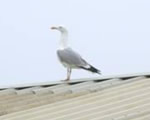 Go to main content
Go to main content
Archive Website of the UK government
Please note that this website has a UK government accesskeys system.
Main menu
Page menu
Home and community

How to deal with nuisance birds

Some bird species can create a nuisance, including fouling and even causing damage to property. However, all wild birds in the United Kingdom are protected by law. Find out about the options open to you when dealing with a problem involving wild or captive birds.
Legal protection for wild birds
Choosing the right course of action is essential, as it's illegal to intentionally harm or kill any wild bird species. You are not allowed to take wild birds’ eggs – and disturbing, damaging or destroying nests is against the law.
Identifying the bird
If you’re having bird problems, it's important to identify what sort of bird is causing the problem. It may affect what you can do about the problem. For example, disturbing certain specially protected birds when they are on or near their nest is illegal, so scaring isn’t appropriate.
Follow the links below to:
- identify a bird using the Royal Society for the Protection of Birds (RSPB) website
- see a list of birds specially protected by the Wildlife and Countryside Act 1981
Solving the problem without harming the bird
A broad range of techniques is available to deal with nuisance caused by birds. These include:
- noise deterrents or audible scarers, like recordings of the bird’s own alarm calls or loud bangs
- using a scarecrow or other visual scarer
- using netting or bird-spikes (‘proofing’) to prevent birds landing or accessing areas where they’re known to cause problems
- restricting access to food – for example, by cleaning up food spills immediately and keeping rubbish in secure bins
Using proofing
An example of where proofing can be used effectively is with the Herring Gull. The gulls commonly nest on roof-tops, where their noise and swooping at people can be a nuisance. Proofing the site before the gulls return in spring can prevent this problem from happening again.
Netting and spikes can also be used very effectively to prevent pigeons nesting or roosting.
Not feeding birds in urban areas
Feeding problem wild birds in public urban areas can make the birds expect food from people and can cause swooping. Swooping can scare some people, and large aggressive species like gulls can actually cause injury.
Feeding can also greatly increase populations of birds like waterfowl and pigeons.
Deterring birds: advice
The Royal Society for the Protection of Birds (RSPB) has advice on deterring a number of birds that are seen as pests, including pigeons and gulls. See the links below for further information.
Taking further action to deal with nuisance birds
Because it's illegal to intentionally harm or kill birds, not all of the measures you are allowed to take are lasting solutions.
The law recognises that in some circumstances, you may need to take action that would normally be seen as an offence. You need to get a licence to be able to do this (this process is called ‘licensing’).
Licences are only available under certain conditions, the two most relevant to nuisance problems being:
- to protect public health and safety
- to prevent serious damage to crops, vegetables and fruit
You can read more information and advice about licensing on Natural England’s website.
Organisations that can help with bird problems
You may be able to get advice about how to deal with injured and nuisance birds from:
- the Royal Society for the Protection of Birds (RSPB)
- the Royal Society for the Prevention of Cruelty to Animals (RSPCA)
The Royal Society for the Protection of Birds
The RSPB can offer you advice about birds and bird-related law, but does not collect young or abandoned birds. You should leave these where you find them. Follow the link below to find out more about wild birds and the law.
The Royal Society for the Prevention of Cruelty to Animals
The RSPCA or a private veterinary practic can advise you on what to do with injured birds.
Privately owned nuisance birds
If somebody owns a bird that makes an unacceptable amount of noise, you can deal with it as you would any other noise problem. For advice on how to do this, see ‘Dealing with a noise nuisance’.
If the bird is causing a problem that is, or is likely to be, damaging to health or a nuisance, this may count as a statutory nuisance. Your council has a duty to investigate this. For more information, see ‘Solving a dispute with a neighbour: an introduction’.
Local councils and nuisance birds
Local councils have limited ability to deal with bird-related problems, as these aren't usually within their responsibility. However, in some circumstances, they may take action under a general licence to reduce feral pigeon or gull numbers for public health reasons.
 Facebook
Facebook Twitter
Twitter StumbleUpon
StumbleUpon Delicious
Delicious Reddit
Reddit